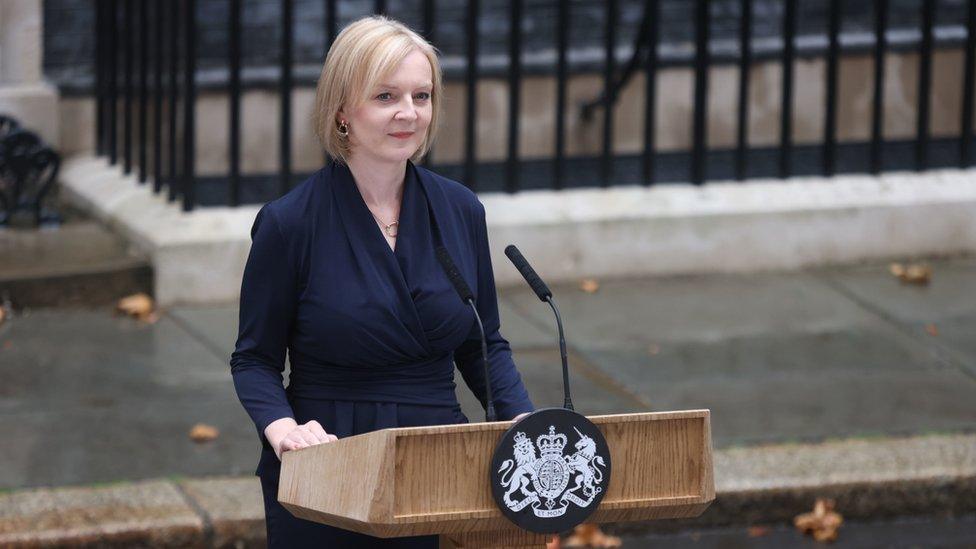Liz Truss set to unveil plans to limit energy bill rises
- Published
- comments

The new PM Liz Truss has pledged to "deliver on the energy crisis"
New Prime Minister Liz Truss will unveil plans to limit energy bill rises on Thursday, spending billions to protect people from soaring prices.
Typical household energy bills could be capped at around £2,500 a year, with firms also likely to get some relief.
It is unclear how long the support will last, but the government is expected to borrow at least £100bn to pay for it.
Currently, a typical household's annual gas and electricity bill is due to rise from £1,971 to £3,549 in October.
Experts and charities have warned that without help with soaring energy bills, lives will be at risk this winter, as people struggle to afford basic day-to-day living costs.
However, the End Fuel Poverty Coalition pressure group estimates that if the energy price cap is frozen at £2,500, 6.9 million UK households will still be in fuel poverty this winter - up from 4.6 million last winter.
The recent increase in consumers' bills follows sharp rises in wholesale gas prices largely due to the conflict in Ukraine, which has reduced supplies of Russian gas.
Ahead of the announcement, Ms Truss said she knew families and firms were worried about "how they are going to make ends meet this autumn and winter".
"Putin's war in Ukraine and weaponisation of gas supply in Europe is causing global prices to rise - and this has only made clearer that we must boost our long-term energy security and supply," she said.
She pledged to "tackle the root cause of these problems, so that we are not in this position again".
To limit the amount customers' bills go up by, the government is expected to compensate energy firms for the difference between the wholesale price for gas and electricity they pay and the amount they can charge customers.

How is the rising cost of living affecting you? Do you have any questions for our experts? Get in touch.
WhatsApp: +44 7756 165803, external
Tweet: @BBC_HaveYourSay, external
Please read our terms & conditions and privacy policy

Customers will not be expected to repay the help, with the huge support package due to be funded by the government borrowing about £100bn.
The final sum will depend on the cost of energy on the international energy markets - which can be extremely volatile - as well as whether additional support is offered to the most vulnerable households.
But Labour said the government should extend a windfall tax on gas and oil company profits to pay for the package - with leader Sir Keir Starmer warning that working people will be footing the bill for "vast" energy firm profits under her plans.
Ed Miliband, the shadow secretary for climate change, told the BBC on Thursday: "We know that the energy companies are making excess profits of £170bn over the next two years
"I cannot understand - apart from ideology and dogma - why the first port of call should not be [taxing] these excess profits."
The government is, however, planning a shake-up of the energy market, the BBC has learned. Following a series of meetings with officials, energy companies - mainly in the nuclear and renewables sector - have agreed in principle to accept new long-term contracts at fixed prices well below current rates, BBC climate editor Justin Rowlatt said.
Most accept that the profits they are making currently are not sustainable during a national crisis, he added.
However, Mr Miliband said accepting "slightly lower prices now" would mean "much higher prices" in future and be a "terrible deal for billpayers".

Rocketing prices are leaving households facing eyewatering energy bills. Several councils are considering setting up "warm banks" - community spaces for people who cannot afford winter heating - while some teachers are warning of cuts to staff, school trips or courses to cover rising costs.
Every household in the UK is already due to be given a one-off £400 discount on their fuel bills from October - a move announced by Ms Truss's defeated leadership rival Rishi Sunak while he was chancellor.
And £650 will be paid to more than eight million low-income households who receive benefits or tax credits, alongside further payments to pensioner households and disabled people.
The current price cap - set by Ofgem and which limits the maximum amount domestic customers can be charged for each unit of energy - is due to increase in October. It will mean a typical household will pay £3,549 a year for their energy.
Unlike households, businesses are not protected by an energy price cap. Many are currently facing even sharper rises in energy bills than households, which could lead to firms going under or cutting their wage bills by firing staff.
But firms are also expected to receive some relief under the new plan.
The system to support business could be more complex than that for households and is likely to be reviewed more often. According to reports, it could see the government force energy firms to offer specific reductions on the unit price of the energy used by firms.
Business groups have welcomed the plan, although the British Chambers of Commerce warned "it remains to be seen" whether it goes far enough in providing the support that firms need.
Abdul Shahid, who runs the Masala restaurant in Derby city centre, said his business needed help "now, not three months later".
"Our energy bills have more than doubled in many cases and all of our ingredients have gone up as well," he told the BBC's Today programme. "We are definitely thinking about shutting our doors, it's very stressful."
Rosemary Brown, director of Bluebell Dairy, a luxury ice cream maker, said her energy costs had jumped from £35,000 a year to £80,000. That would rise to £225,000 a year if she renewed tomorrow, she added.
"We need help with capping the energy costs for the immediate future. We also strongly need to see some investment from the government in renewable energy so that 12 months along the line we've got systems in place."
If businesses are included, that could see the overall cost of the government support package rise to well above £100bn.
The cost of UK government borrowing is currently at its highest level for eight years, with the yield on 10-year bonds rising above 3%. The rise in yield indicates investors' anticipation that the government will have to borrow more in future. It also means any future borrowing will be more expensive.
Shorter recession
However, some economists have suggested that plans to cap energy bills could mean that increases in the cost of living will peak earlier and be "significantly lower" than previously forecast.
The cost of living is currently rising at its fastest rate in 40 years, with prices 10.1% higher than the same time last year. The rise is largely driven by the sharp rise in energy prices.
Investment bank Goldman Sachs said that a cap on household energy bills could see inflation peak at 10.8% in October, rather than the 14.8% forecast before. It also sees prices falling more quickly as well, with inflation slowing to 2.4% by December 2023.
The Bank of England also said the plan could slow rising prices.
However, both cautioned that there was uncertainty around what exactly the plan will look like and what would happen once any cap is lifted.
Economists also expect the UK to fall into a recession despite Ms Truss' energy support plan - albeit a shorter and less severe one.
The Bank of England predicted the UK will enter a recession later this year - with the Bank's governor Andrew Bailey saying there is little that can be done to stop that happening.
Meanwhile, Ms Truss is also reportedly set to announce she is scrapping the ban on fracking which was introduced in 2019 over concerns it was causing earth tremors.
The controversial gas extraction technique involves drilling into the earth and directing a high-pressure solution at a rock layer to release the gas inside.

RUN FOR FUN: Nine tips to make running more enjoyable
DOGGY DIET: Is expensive dog food actually better?

Related topics
- Published6 September 2022
- Published6 September 2022

